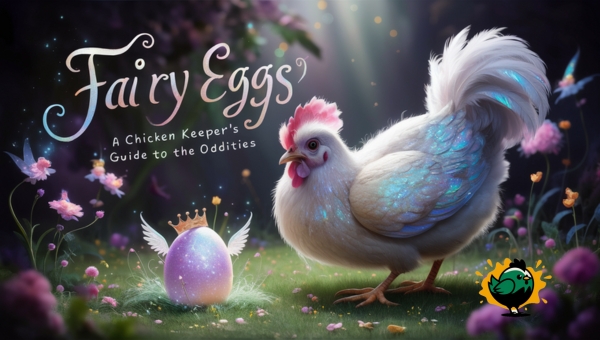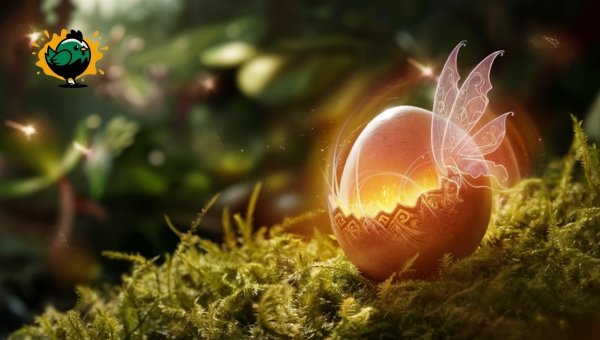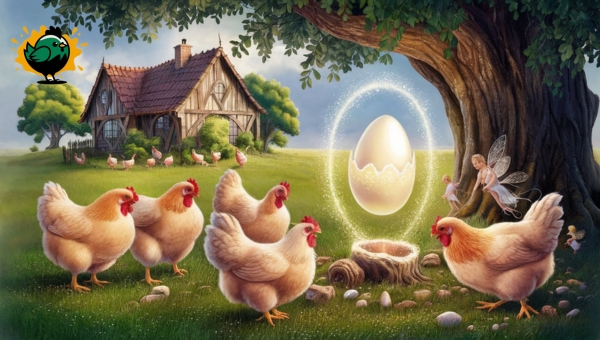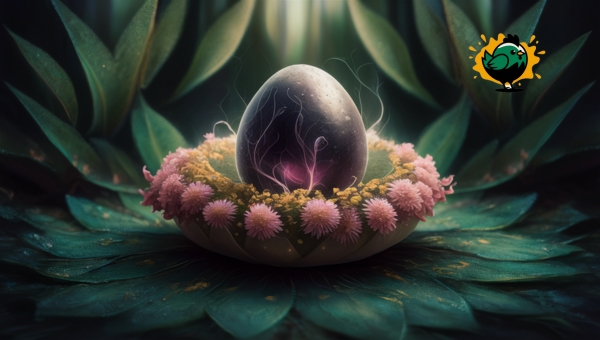Fairy Eggs | A Chicken Keeper’s Guide to the Oddities

One morning, opening the coop to saw a little, yolkless egg tucked in among the usual suspects. Many chicken keepers are interested and perplexed by this tiny treasure, also called a fairy egg. Every enthusiast for chickens should be aware of this fascinating feature of their biology: fairy eggs.
In this article, we’ll delve into the world of fairy eggs, exploring why they occur, whether certain breeds are more prone to them, and how to handle and prevent them in your flock. So, let’s embark on this journey to uncover the captivating secrets behind these peculiar eggs.
What Exactly is a Fairy Egg?
A fairy egg is a tiny egg often found in a chicken coop, sparking curiosity among chicken keepers. These small eggs typically lack a yolk, containing only the egg white within their shell.

Understanding why these eggs occur can help chicken owners manage their flocks better. Let’s explore whether some chicken breeds are more prone to laying fairy eggs.
Are Certain Breeds More Prone to Fairy Eggs?
Fairy eggs can occur in any chicken breed, but some breeds may be more susceptible due to their reproductive characteristics. For example:
- Breeds that mature quickly: These breeds might lay fairy eggs more frequently during their initial laying phase.
- Individual variation: Regardless of breed, individual hens can vary widely in their tendency to produce fairy eggs.
- High-production breeds: Breeds known for high egg production might experience occasional misfires, leading to fairy eggs.
While fairy eggs are a fascinating aspect of chicken biology, they are usually harmless and not a cause for concern. Understanding the factors behind their occurrence can help chicken keepers better manage their flocks and ensure healthy egg production.
Why Do Chickens Lay Fairy Eggs?
Understanding why chickens lay fairy eggs is essential for any poultry enthusiast. These tiny, yolk-less eggs can be an interesting, yet sometimes puzzling, occurrence. Let’s explore the reasons behind this phenomenon.

- Immature Reproductive System:
- Aging Hens:
- Stress Factors:
- Nutritional Deficiencies:
- Random Glitches in Production:
Understanding these factors can help chicken owners manage their flocks more effectively and ensure healthy egg production.
Also Read: The Best Chicken Breeds for Kids-A Fun Guide
Is a Fairy Egg a Sign of a Problem?
Fairy eggs can spark curiosity among chicken keepers, but they may also raise concerns. Knowing when these tiny eggs are normal and when they could signal a health issue is crucial. Let’s explore the scenarios in which fairy eggs are harmless and when they might require a closer look.

When to Be Concerned
Fairy eggs are usually not a cause for alarm if they occur occasionally. Young hens, or pullets, often lay these small eggs as part of their natural development process.
Similarly, older hens nearing the end of their laying cycle might produce fairy eggs more frequently. However, if you notice a consistent pattern of fairy eggs in your flock, it may be time to investigate further.
Here are some instances when you should be concerned:
- Frequent Occurrence: If fairy eggs appear regularly, it could indicate underlying issues such as hormonal imbalances or reproductive problems.
- Other Symptoms: Look out for additional signs of distress or illness in your hens, such as lethargy, changes in appetite, or unusual behaviors.
- Diet and Environment: Assess your flock’s diet and living conditions. Poor nutrition and stressful environments can contribute to the production of fairy eggs.
If fairy eggs persist despite addressing these factors, consulting a veterinarian is advisable to ensure your hens’ health.
Can You Eat Fairy Eggs?
Many chicken keepers wonder if fairy eggs are safe to eat. The good news is that fairy eggs are indeed safe for consumption. Although they typically lack a yolk and are smaller in size, they still contain egg white, which is perfectly edible.
Here are some considerations regarding the consumption of fairy eggs:
- Safety: Fairy eggs do not pose any health risks and can be eaten just like regular eggs.
- Nutritional Value: While they are safe to eat, fairy eggs have limited nutritional value due to the absence of a yolk. They contain only egg white, which is mostly protein.
- Usage: Because of their small size, many chicken keepers choose to use fairy eggs in creative ways, such as adding them to scrambled eggs or using them in baking.
In essence, fairy eggs can be a fun addition to your culinary experiments, even if they don’t pack the same nutritional punch as regular eggs.
Also Read: Mystic Onyx Chicken | The Must-Know Enigmatic Breed
Handling and Preventing Fairy Eggs
Managing and preventing fairy eggs in your flock is key to maintaining healthy egg production. By focusing on reducing stress and ensuring proper nutrition, you can help your hens lay more consistently and avoid the occurrence of these tiny, yolkless eggs.
Managing Stress in the Flock
Stress can significantly impact your chickens’ egg-laying habits, leading to the production of fairy eggs.
Here are practical tips to help reduce stress in your flock:
- Provide Adequate Space: Chickens need enough room to move around comfortably. Overcrowding can lead to stress, pecking, and even injuries. Ensure each bird has sufficient space in the coop and run.
- Minimize Disturbances: Loud noises, sudden movements, and frequent handling can stress chickens. Keep their environment calm and stable, especially during laying times.
- Consistent Feeding Schedules: Chickens thrive on routine. Feed them at the same times each day to create a sense of predictability and reduce anxiety.
- Clean Living Conditions: Regularly clean the coop to avoid the buildup of waste and bacteria. A clean environment promotes health and reduces stress.
- Safe and Secure Environment: Protect your flock from predators by securing the coop and run. Feeling safe is crucial for reducing stress levels in chickens.
- Social Harmony: Monitor the flock dynamics to ensure there is no bullying or aggressive behavior. If necessary, separate aggressive birds to maintain peace within the group.
Ensuring Proper Nutrition
A balanced diet is essential for healthy egg production and can help prevent the occurrence of fairy eggs.
Here’s how to ensure your chickens receive the proper nutrients:
- High-Quality Feed: Use a commercial layer feed that provides the necessary vitamins, minerals, and protein. This ensures your hens get balanced nutrition tailored to their needs.
- Calcium Supply: Calcium is crucial for strong eggshells. Provide a constant supply of crushed oyster shells or limestone grit to supplement their diet.
- Fresh Water: Always ensure that clean, fresh water is available. Dehydration can affect egg production and overall health.
- Supplemental Treats: While treats should not replace balanced feed, offering occasional kitchen scraps and greens can provide additional nutrients and keep the hens engaged.
- Monitor Health: Regularly check your hens for signs of illness or malnutrition. Healthy chickens are more likely to produce regular, healthy eggs.
- Avoid Overfeeding: Overfeeding can lead to obesity, which impacts egg production. Stick to recommended feeding guidelines to maintain optimal health.
By focusing on these strategies, you can help reduce the incidence of fairy eggs in your flock and support your hens’ overall health and productivity.
FAQs
Are fairy eggs dangerous for my chickens?
Fairy eggs are generally not dangerous for your chickens. They are a natural occurrence and typically don’t indicate any immediate health issues.
How often can a hen lay a fairy egg?
A hen may lay a fairy egg infrequently, often during the beginning or end of her laying cycle. Frequent occurrences could indicate stress or health problems.
Do fairy eggs mean my hen is sick?
Fairy eggs don’t usually mean your hen is sick. However, if you notice frequent fairy eggs, it might be wise to consult a vet to rule out any potential health issues.
Conclusion
Fairy eggs are a fascinating phenomenon in the world of chicken keeping. Although they may appear unusual, they are generally harmless and can be attributed to several factors such as a hen’s age, stress, or an immature reproductive system. Understanding these tiny eggs can help chicken enthusiasts better manage their flocks and ensure optimal egg production.
Whether you’re a novice or an experienced poultry keeper, knowing about fairy eggs is crucial for maintaining a healthy coop. Curious to learn more? Dive into our other blogs to explore a wealth of information on chicken care and egg production!
